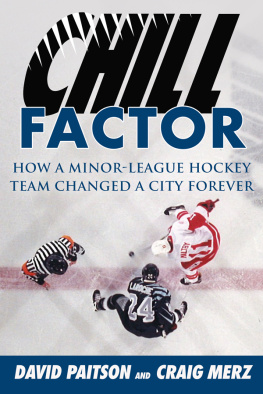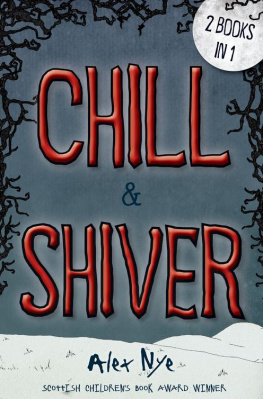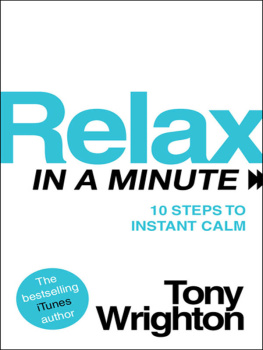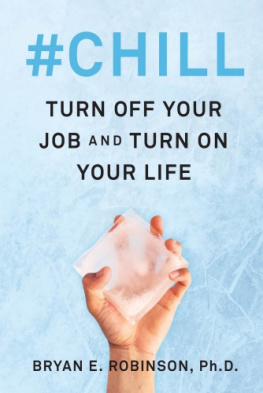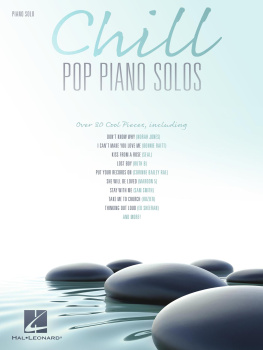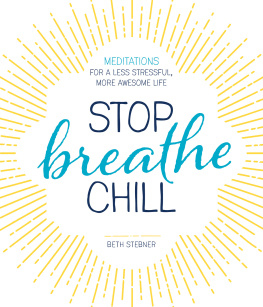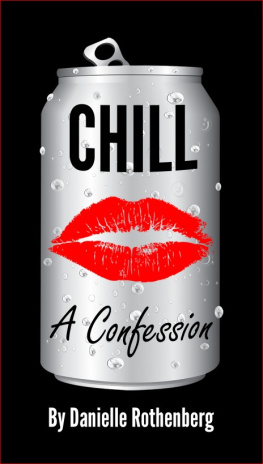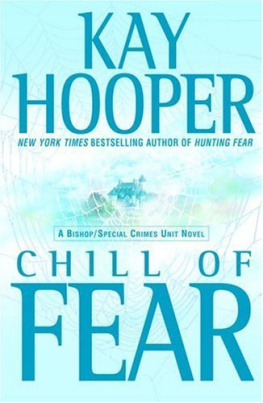ACKNOWLEDGMENTS
For their support, guidance, and ability to help me de-stress while writing Chill , I am filled with gratitude toward:
My husband, Derin: Thank you for your seemingly endless support, your keen observations, and, most of all, your love.
My son, Asher: For your impromptu hugs, infectious laughter, and constant reminder of how to live in the moment.
My mom and dad, Dale and MaryLou: For always listening to my babbling commentary about the progress of this book.
My sister, Michele: Thanks for being the ace in my back pocket and making yourself continually available to read and comment on draft after draft (after draft).
My in-laws, Barbara and David: For your encouragement and interest in my writing ventures.
My support team of Alice, AnneMarie, Ed, and Rene: Thank you for always being there for me!
My dog, Baxter: For being the perfect excuse to take running breaks while on tight deadlines.
My girls night girlsAlison, Mardi, Sara, Gina, and Elizabeth: Thanks for reminding me of the importance of downtime when feeling the crunch.
Lisa Viscardi: For your friendship and for sharing your insights on organization with the readers.
Rene Adams: For your thoughtful review and contribution of material on zoning out and tuning in.
My agent, Susan Schulman: Thank you for being such a pro and for being so continually supportive of my mission.
My editors, Anica Mrose Rissi and Patrick Price: Thank you for your professionalism, for your enthusiasm, and for making this book so much better through your thoughtful comments and contributions.
Michelle Nagler: Thank you for bringing this idea to me and being such a wonderful advocate.
Bethany Buck: Thank you for championing this book and giving me the opportunity to update it for the next generation of teen girls.
Neryl Walker: Thank you for bringing such beauty and sophistication to the pages of this book through your illustrations.
The incredible designers who brought the content of this book to lifeRussell Gordon, Joel Avirom, Jason Snyder, and Meghan Day Healey: You are so good at what you do!
To my power team at Simon & Schuster, who put their all into making this book a success: Bethany Buck, Paul Crichton, Katherine Devendorf, Jaime Feldman, Lucille Rettino, Bess Braswell, Kelly Stocks, Carey OBrien, Victor Iannone, Jim Conlin, and Beth Sue Rose.
And last but not least, to the girls behind the anecdotes throughout Chill : Thank you for sharing your stories with me.... This book is for you!
Other Simon Pulse nonfiction books you might enjoy
In Their Shoes:
Extraordinary Women Describe Their Amazing Careers
Deborah Reber
Doing It Right:
Making Smart, Safe, and Satisfying Choices About Sex
Bronwen Pardes
What If?:
Answers to Questions About What It Means to Be Gay and Lesbian
Eric Marcus
From Simon Pulse/Beyond Words
Doable:
The Girls Guide to Accomplishing Just About Anything
Deborah Reber

A bestselling author, sought-after speaker, and life coach, DEBORAH REBER is passionate about giving girls practical tools to help them rock their lives. Her teen books include Doable, Language of Love, In Their Shoes, and Chicken Soup for the Teenage Soul: The Real Deal. She recently moved to Amsterdam with her family. Find out more at www.debbiereber.com.
SIMON PULSE
Simon & Schuster, New York
Watch videos, get extras, and read exclusives at
TEEN.SimonandSchuster.com
authors.simonandschuster.com/Deborah-Reber
1
WHAT IS STRESS?
Stress seems to be on just about everyones minds these days. I get tons of e-mails and letters from teen girls sharing their personal tales of stress and angst in their lives. So how do you define stress?
Stress is the feeling you get when youre taking on too much, or people are demanding on you too much.
ZOE, AGE 17
I would define stress as being overwhelmed with a certain problem or person.
ALIA, AGE 16
Stress is tension, whether emotional or physical. You can be stressed out about friendship troubles, or you can be stressed out about lack of sleep. You can get impatient in a long line at the grocery store, or your body can be stressed out by overexerting yourself in an exercise or sport.
GWYN, AGE 15
All great definitions. Heres how the American Academy of Pediatrics defines stress: [Stress is] the uncomfortable feeling you get when youre worried, scared, frustrated, or overwhelmed. It is caused by emotions, but it affects your mood and your body.
That definition might be straightforward enough, but stress sure doesnt feel straightforward to deal with. Yes, its a normal part of life, but that doesnt mean it wont take a toll. Let stress run rampant and your mind, body, and soul will pay the price.
The Origins of Stress
Have you ever been in a situation where you went from calm to terrified in a split second? Maybe you were jolted awake in the middle of the night by a suspicious noise coming from inside your house. Or maybe you stepped into a busy intersection just as a car darted out of nowhere and narrowly missed hitting you. Maybe you were water-skiing, and, as you waited for the boat to swing around and pick you up, your mind turned to the movie Jaws , and you nearly freaked out big-time.
When youre thrust into a situation that feels dangerous, scary, or potentially life-threatening, your body switches to autopilot, and your nervous system takes over. Once your brain makes an internal announcement that something is wrong, your body responds by automatically releasing the hormone adrenaline into the blood stream. Thats when the party really gets started. The adrenaline affects you by:
increasing your heart rate (so you can take in more oxygen in case you need to run or exert yourself)
raising your blood pressure (a result of your heart beating faster and your blood vessels constricting)
sending more blood to your muscles so youll be ready to react quickly and with power
Your body also releases cortisol, another hormone that works with adrenaline to:
give you a quick burst of energy
improve your memory
increase your ability to withstand pain
If youve ever experienced a surge of adrenaline, or an adrenaline rush, you might have noticed that things suddenly appeared to be happening in slow motion. Maybe you felt a rush of blood to your arms, legs, hands, or feet. Or maybe you broke out in a sweat, or suddenly felt shaky and nauseous. These are all classic symptoms of the fight-or-flight response, a subconscious preparation by your body to do what it takesstay and fight or turn and runto survive any situation. They are also the classic symptoms of what we call stress.
In emergencies, stress can be a good thing. Its a survival tool, and a pretty efficient one at that. Stress isnt always a negative in your day-to-day life, either. Its stress that gives you that extra oomph while youre playing in the state soccer tournament, or when youre pushing to meet an impossible deadline. Small amounts of stress can keep you on your toes and push you to perform at your highest level. But what happens when youre dealt too much?
When Stress Doesnt Go Away
Just as your bodys stress responses switch on during an emergency, theyre supposed to switch off once the crisis has passed. Your heart rate should go back to normal, the sweating should stop, and the queasy feeling in your stomach should vanish.
But the problem comes in when your body repeatedly gets tricked into responding to stresses that arent life threatening. Anxiety about next weeks midterm can trigger the same fight-or-flight response as a serious threat. But since you dont actually need your survival hormones to get through your midterm, youre left with extra adrenaline and cortisol hanging around. The result? Chronic stress. Your body starts exhibiting classic stress symptoms all the time . Instead of giving you a boost to power through an emergency, the stress starts wearing you down. And thats when the trouble begins.



